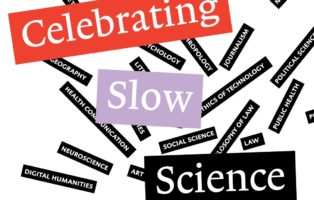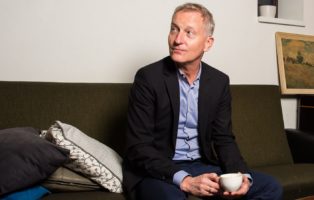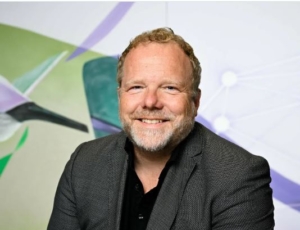Welcome to all of you, especially our new fellows, to the opening of this academic year at NIAS. I am very happy to see so many new faces, here in Eye and online.
It has been a tough year; these are challenging times. The second semester of the last academic year was –of course- heavily influenced by COVID-19. We did our best, by moving our community online and re-inventing ourselves as a hybrid organisation.
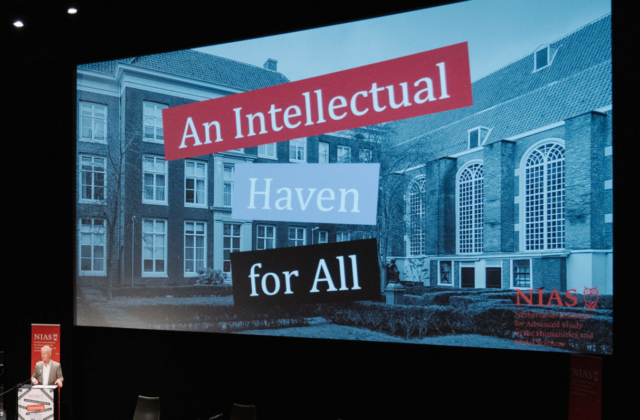
But at the same time, we tried to understand what COVID meant and means for our work; how the self-isolation affected our thinking, our relations and our health. We took the time to reflect and discuss the impact of COVID on society; how the pandemic influences the place of science amidst fake news and conspiracy theories; how it influences the future of care, of social relations, of notions of proximity, of home.
You can find reflections on these questions by NIAS fellows in this book, Food for Thought.
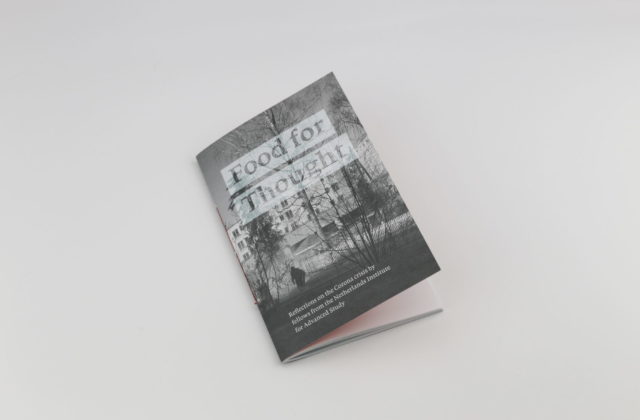
Our ambition to be an intellectual haven for our fellows is still relevant and pertinent as always – but what exactly is an online haven? How do we ensure that our space feels as a haven, an intellectual haven, where one is free to ask questions, to doubt and explore collectively; also for the fellows who can’t physically be here (yet) but who are part of our NIAS-community.
How do we ensure that our space feels as a haven, an intellectual haven, where one is free to ask questions, to doubt and explore collectively?
Let me say somewhat more about our ambition to be an intellectual haven for all. When we reflect on the notion of ‘haven’, the histories of Institutes for Advanced Study are interesting because they tell us a lot about the place of science in society, about the boundaries between society, politics and academia, or the lack thereof. The start and development of the first IAS at Princeton was directly related to the coming to power of German Nazism and the Nazification of German universities, pushing many scholars out of the country (and worse).
It is not a coincidence that totalitarian ideologies and regimes attack intellectual havens, ‘free spaces’ of thought and research. For example the Collegium Budapest was one of the first institutions forced to close by Orban. These are examples in which boundaries between spheres – in this case politics and science – are no longer respected; science becomes politicized and subordinated to political ideologies. The irony is that this usually happens when politicians claim that science itself has become ideological and too political. Take the example of gender studies, a well-respected discipline by now, that is disqualified as ‘gender ideology’, by political ideologues. The defense of the autonomy of science is necessary as is the defense of expertise as such.
Being a haven also implies being at a calm place (last year’s topic of the opening event was “slow science” which elaborated this point). I celebrate that science at NIAS, in terms of pressure and pace, is probably the calmest, slowest and the least competitive place in the Netherlands. This time to reflect, to pause, to question, to invent, to read, to think has become scarce at many institutes for higher education. Nevertheless, I do not want NIAS to become popular because conditions at universities are further deteriorating. I want NIAS (and other IASs) to be attractive because of our characteristics as a close-knit truly interdisciplinary intellectual community that is open, non-competitive, diverse and inclusive, for scholars, writers, journalists and artists.
Don’t get me wrong. Emphasizing the autonomy of our institution, our haven, does not imply a plea for a return of academic ivory towers. In fact, as many of you will hopefully have noticed, we have been ‘opening up’, reaching out to new audiences and bringing science to the ‘public’. We are committed to sharing knowledge with various audiences and, contribute to contemporary political and public debates.
But let me come to the even more difficult part of our ambition: being an intellectual haven for all. Some of you might have frowned while reading the title of this afternoon event: “Seriously, the most exclusive academic institution of the Netherlands has the ambition to be inclusive”? My answer to those sceptics is a clear yes, we do! Particularly institutions that are difficult to get in, so exclusive, should make all efforts to select on the basis of inclusive criteria – not on the basis of established categories, powerful networks, dominant genders or hegemonic methodological approaches.
Although we have started to diversify our fellows’ groups and make our institute more accessible for highly talented thinkers from all over the world and from various backgrounds, does this mean that we are already a haven for all? That we can rest on our laurels? No, not at all, and we will discuss NIAS ambitions to further diversify this afternoon.
But this idea of an “haven for all” is not just about individual fairness – it is also about the collective context in which good arts and science flourishes.
But why do we aim to be “an intellectual haven for all” when places at NIAS are actually quite limited? Well, what we mean by haven for all is equal chances of access, based on fair and relevant criteria, that are always up for discussion since we might be blind for our own biases as well. But this idea of an “haven for all” is not just about individual fairness – it is also about the collective context in which good arts and science flourishes. We expect that individuals from various backgrounds will contribute to better collective scholarship: the whole will be more than the sum of its parts. To value and foster the variety of perspectives of a diverse group is not an easy thing to accomplish – but we are deeply convinced that the progress of our knowledge depends on the insights of the multiplicity of perspectives, approaches and methodologies.
We at NIAS welcome debates on what defines or characterises ‘good research’. What are our existing criteria, and why? And who has the means to contribute to good science, good arts? At NIAS, we believe that only through collective and inclusive ways of learning, science and arts can play their role in society.
This afternoon we will highlight the intrinsic value of interdisciplinarity, discuss the convergence of arts and sciences, and learn more about NIAS’ ambitions and actions to further diversify. I look forward to an inspiring start of an even more inspiring academic year at NIAS. Thank you.
Watch the Opening of the Academic Year 2020/21 here:
Watch the Opening of the Academic Year 2020/21
